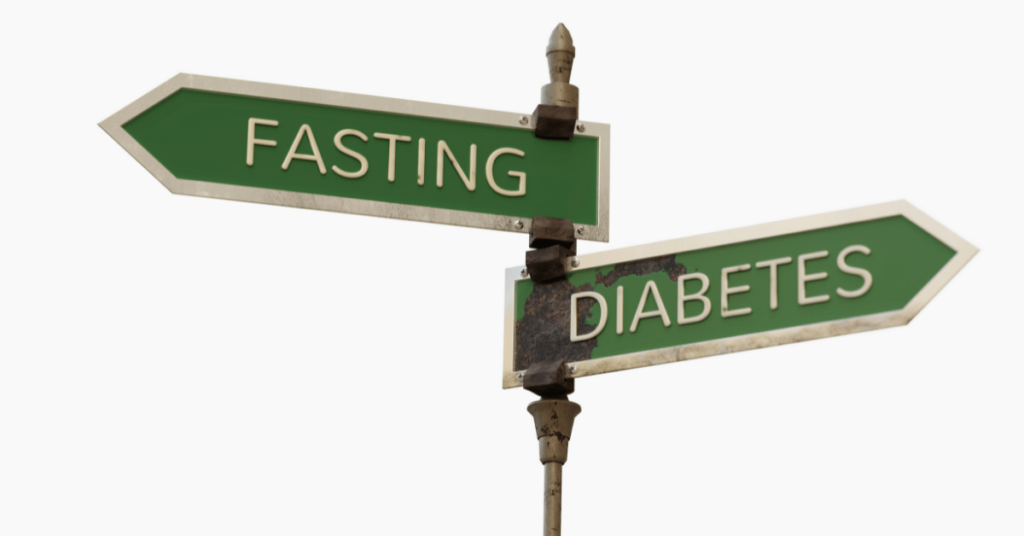Contents
Fasting and Diabetes
There is a lot of buzz around if diabetics should fast or not? Will it be safe for diabetics to not eat for such a prolonged time? If fasting could bring better health for people with diabetes, is it helpful in losing weight and decreasing the insulin demand? Some studies suggest fasting may prove beneficial for diabetics.
How Fasting Lowers Blood Sugar Levels?

Normally, when we eat food, we extract glucose from it for energy. And our body produces insulin to send the glucose from the blood to cells. In diabetes, our pancreas can not produce insulin, or our body develops insulin resistance which causes the sugar to accumulate in the blood.
When we are fasting, we are not consuming glucose, and it decreases the need for insulin. Lack of sugar in the blood forces the liver to use stored glycogen for energy. Our liver has enough glycogen for 1-2 days. If our fasting period lasts longer than this then our body starts using fat and protein for energy. This process of burning fat leads to weight loss. As obesity is one of the root causes of diabetes, losing weight can help control blood sugar levels. Fasting is also helpful in bringing the cholesterol and blood pressure levels down.
Is Fasting Safe for Diabetics?
Fasting is safe for diabetics. But it has to be done under observation. Tell your doctor beforehand, so they can reduce the insulin dose during fasting. If fasting is done with proper guidance, it can help in reversing diabetes as well. However, it should be done with great care. Because if you are taking medicine then not eating for a long can cause some problems.
How Should Diabetics Fast?

Some fasts don’t allow any food at all. But for diabetics, it is recommended to follow a pattern of fasting and then eat normally. You can have some foods in between like-
- Water with chia seeds, low glycemic vegetable juices, or smoothies with minimal fruit.
- Drink herbal tea, cinnamon tea, green tea, clear vegetable soups,
- Eat almonds, walnuts, peanuts, and cashew butter.
You can not eat grains, pulses, and fruits. Only take low-sugar vegetables with smoothies.
Fasting Tips
There are some measures that you should follow to avoid abnormal blood sugar levels. These could are-
- You should inform your doctor
- Eat nutritious foods after the fast is over
- Find out what suits you before fasting for a longer period of time
- Fast on alternative days- you can eat your regular diet one day, and then eat fewer than 600 calories the next day.
- Stay busy, and happy
- Stay hydrated
Benefits Of Fasting

Fasting may have some health benefits. For example, it could help relieve inflammation, help with weight loss, and lower cholesterol.
One very small study included three men who had had type 2 diabetes for 10-25 years. With medical supervision, the men fasted every other day or 3 days a week. Within a month, all of the men were able to stop taking insulin. And in less than a year, they were able to cut down on or stop other diabetes medications. In another small study, 10 obese men with type 2 diabetes followed a time-restricted eating plan. They improved their fasting glucose and lost weight over 6 weeks. Fasting can also lower the risk of heart diseases and other complications of diabetes.
Risks Of Fasting In Diabetes

When you start fasting, you will feel irritated and annoyed due to hunger. But after some time, you may get comfortable not eating. You may get headaches because of a lack of nutrients in your body.
Fasting can be dangerous for diabetics, as not eating for a prolonged time can cause hypoglycemia and even hyperglycemia. Hypoglycemia may occur if you are on medicines of diabetes such as insulin. when you do not eat, it’s natural for sugar levels to go down, but if you are taking medicine it may drop sugar levels even more. In such conditions, you may develop hypoglycemia which could be dangerous. That is why it is advised to fast after informing your doctor and reducing your insulin doses.
Hyperglycemia may occur when you break your fast by eating unhealthy. If you consume too many carbohydrates after the fasting ends, then it may cause a sudden spike in your blood sugar levels which is bad news. So, try to break your fast with minimum carbohydrate foods.
A Word From MantraCare
Do you want to get rid of diabetes? Join our online diabetes consultation program and reverse your Diabetes naturally through lifestyle changes such as a Personalized Diet plan, Exercise, dieticians, and health coaches.


